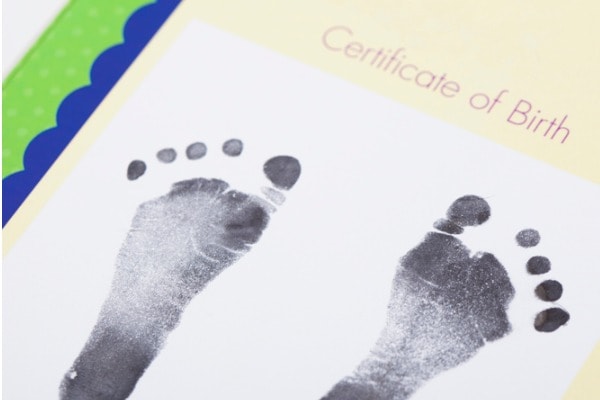Limitations of a Father Not Listed on a Birth Certificate
Why paternity matters and how to establish it voluntarily or involuntarily.
- 4 min read
- custody
- family law

While a baby’s birth certificate usually includes the names of both their mother and father, this is only assumed to be typical for married couples. For parents who are unmarried when their child is born, the birth certificate’s details may be more up in the air based on whether the father’s name is included. To establish a legal relationship and responsibility between a father and his baby, parents must acknowledge or establish paternity through one of several avenues.
Why does paternity matter?
According to the Centers for Disease Control’s (CDC) National Center for Health Statistics, roughly 40% of babies in the U.S. are born to mothers who are not married. While these babies do not have the stereotypical married parents, they may still have involved fathers who are present for the birth and included on birth certificates. In some instances, fathers may be excluded from their children’s birth certificates if they are absent from the birth. Another reason their name would be excluded is if the mother refuses to put the father’s name on the birth certificate.
How does a lack of paternity impact children and fathers?
While it may seem like a minor matter, the lack of established paternity can impact the child’s future capacity to:
- Receive shelter and financial support from both parents
- Qualify for inheritance provisions from both parents
- Access the father’s health information and history
- Receive the father’s social security, veteran’s, or worker’s compensation benefits
In terms of impacts on the father’s rights, paternity involves legal consequences and determines his ability to:
- Be held responsible for child support and other expenses
- Grant consent for adoption that terminates his parental rights
- Claim custody or visitation rights if separated from the mother
- Add the child as a dependent on his health insurance policy
- List the child as a beneficiary or heir to his assets
- Claim the child as a dependent for tax purposes

What is the process for establishing paternity?
Even if a father is not listed on the birth certificate, that does not mean that he cannot formally establish paternity to request custody or visitation at a later time. To affirm and eventually exercise their legal parental rights, fathers not listed on a birth certificate must go through the process of legally establishing paternity before the child in question turns 18. Conversely, mothers who wish to pursue child support must also establish paternity for the courts to consider a request. While each state has its guidelines and requirements, the overall process to establish paternity voluntarily or involuntarily follows one of several routes.
Can you establish paternity right after the child is born?
If both parents are unmarried and agree to have both names on their child’s birth certificates, they can complete an Acknowledgement of Paternity (AOP) form that varies between states. This form is usually completed voluntarily with a notary present during the mother’s stay at a hospital or facility for the child’s birth.
Can you establish paternity voluntarily?
The father and mother of a child can work together to voluntarily acknowledge paternity or the possibility of paternity if the birth takes place while the parents are unmarried. If the parents marry after the child is born, they can sign a voluntary legitimation form and file it with their state’s court. If unmarried, they can still sign the same form or pursue DNA blood testing to confirm the connection.
Once any form is filed with the courts, it is recorded in any state agencies related to family law. This record ensures the father receives notice of court proceedings regarding the child, including petitions for adoption and actions to terminate parental rights. The father may also seek visitation rights and qualify to pay child support to their child’s other parent.
Once paternity is established and recognized, the father’s name can be added to the birth certificate even after it is issued. While the process differs by state, you will likely have to return the original birth certificate, include a notarized affidavit acknowledging paternity, and pay a fee to add the child’s father’s name to the document.

Can you determine paternity involuntarily?
The child, the child’s mother, or other interested parties may petition the court to establish a man’s paternity by filing a paternity lawsuit against the child’s presumed father. If the mother refuses to admit paternity, the state or the father in question may file the same lawsuit. In either instance, a paternity case will ensue.
While each state has varying laws on the procedure for initiating a paternity case, each parent will generally appear in court to respond to the lawsuit once it’s filed. The court can require the potential father and the child to submit to DNA testing to confirm the relation. Depending on the results of the test, the court will establish the father’s paternity or dismiss the case.
Once paternity is established, the court may proceed with orders for child support, parenting time, joint custody, and other matters related to co-parenting. In addition to the court’s actions, the child’s parents can work together to establish a parenting plan that dictates custody schedules. The court will also direct the related agency in its respective state to add the father’s name to the child’s birth certificate.
There are a lot of different scenarios when it comes to determining paternity, and each scenario comes with its own set of circumstances and potential complications. Parents seeking to establish their or their child’s other parent’s paternity may be overwhelmed by the requirements of the process. Regardless of whether you’re pursuing paternity voluntarily or involuntarily, working with a family law attorney in your area is a crucial tool for understanding the process and its requirements. By equipping yourself with a legal professional familiar with your state’s procedures and guidelines, you can go through the appropriate process confidently. Parents concerned about the cost of an attorney can pursue free or low-cost options to get the benefits of legal expertise without the expenses.